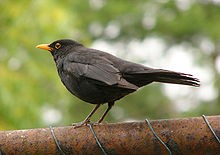Little Black Bird
Several years ago I was on a four-day business trip to Washington, D.C. I was staying in a hotel near the Reagan National Airport.
At this time I was a regular jogger and each morning before the conference I went for a forty-five minute jog. The first morning I jogged on a trail near the airport and I passed some bushes that must have been approximately 8 feet high.
 I noticed that flying above this bush was a little black bird with a yellow beak. It circled the bush and it didn’t fly anywhere else. This bird fascinated me and I watched it closely as I approached the bush and kept looking over my shoulder to watch as I passed it. I was curious why it only flew above this bush. On my return run, it was still there, and again my curiosity was peaked.
I noticed that flying above this bush was a little black bird with a yellow beak. It circled the bush and it didn’t fly anywhere else. This bird fascinated me and I watched it closely as I approached the bush and kept looking over my shoulder to watch as I passed it. I was curious why it only flew above this bush. On my return run, it was still there, and again my curiosity was peaked.
The next morning I went for another run, along the same pathway and I noticed that this little bird was still flying around the same bush. I watched with the same fascination, only this time the events unfolded differently. As I approached the bush, that little bird buzzed me. I mean he went straight at my head and I ducked. I thought this was strange.
On my return run, it dive-bombed me for a second time. In fact, the next day when I went along the same path the bird was still above the bush and it attempted another assault.
As I thought about this incident I wondered why I was being buzzed. I came to the conclusion that this bird thought I was a threat and was protecting her little ones hidden in a nest in the bushes.
As I thought about this incident, I realized that this mother bird is like mothers everywhere who love their children and protect them from danger. Mothers of children with Tourette syndrome or other chronic challenges know how this feels. They know how hard it can be to provide just the amount of protection and to walk away at the right time to allow their children to step up and experience personal growth. The challenge is to know when and how to react with wisdom.
Share This Article:[sgmb id=1]

